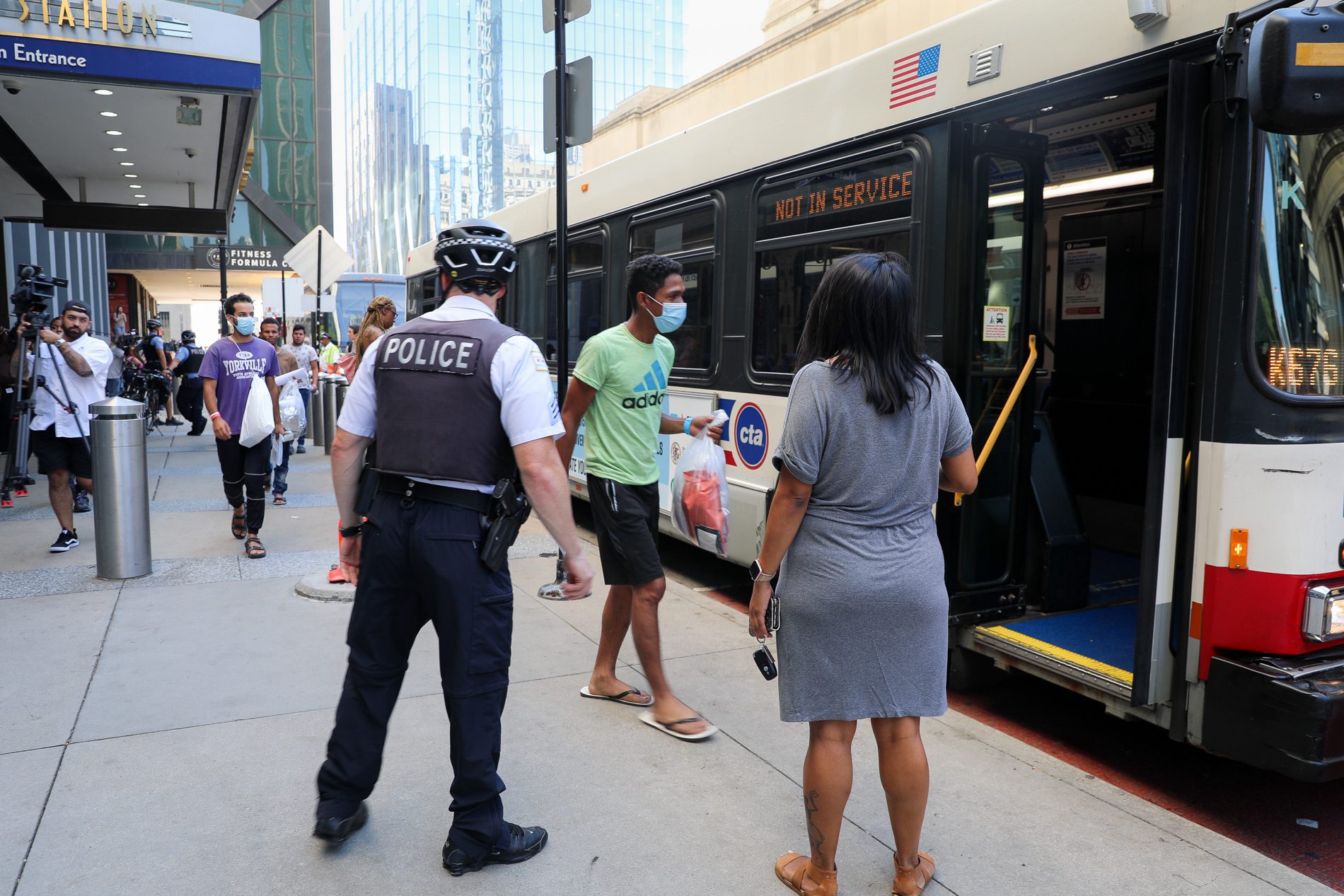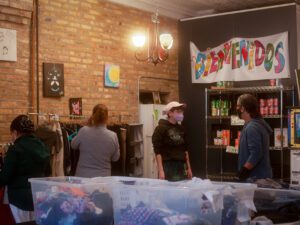 Jesus J. Montero for Borderless Magazine
Jesus J. Montero for Borderless MagazineOver two years ago, migrants from South and Central America started arriving in Chicago by bus and planes. Here are two of their stories.
This story is a collaboration between Northwestern University and Borderless Magazine.
Nearly two years ago, buses started arriving daily in Chicago. They were filled with dozens of migrants mostly from Venezuela, which has struggled with political upheaval and an economic crisis.
More than 42,600 people have arrived in Chicago by bus or plane from Texas and other border states since August 2022. The Venezuelan migrants arriving in Chicago are among more than seven million who have fled their country since 2014. Many come seeking asylum in search of work to make a better life for their families.
The following As Told Tos are a collaboration between Northwestern University undergraduate students and Borderless Magazine. Two asylum seekers share their stories of leaving Venezuela, their dangerous journeys and the struggles of a new life in Chicago.
These interviews have been edited for length and clarity.
News that puts power under the spotlight and communities at the center.
Sign up for our free newsletter and get updates twice a week.
Omar Torres
We left Caracas, Venezuela in September.
We crossed the border and there weren’t any problems there. We got to Necoclí in Colombia, went through the Darién Gap, arrived in Panama, and from there we journeyed our way to Chicago.
The Darién Gap is very dangerous. Many die, many people are raped. It’s very, very ugly.
During the trek, I saw people get kidnapped in Mexico. It was dangerous. We survived because of God, the same one who gave his life for us, that same God. I’ve heard many different versions of this journey. I have a lot of family members who have done it and we’ve all lived out very different experiences.
A friend of mine was kidnapped for a month and when he got released, he had to pay $5,000. Another friend of mine was raped in the jungle. She cries a lot about it often.
I have met people from all over the world. Things are the same for them. It’s not difficult to travel with people who speak different languages because we’re trying to reach the same goals.
My family got to the United States on October 13. We passed through the Río Bravo in Texas. We were treated well. We got here to Chicago on a small plane. We stayed at the airport for a week and then we were taken to the shelter on the North Side, where we lived until May.
At that shelter, we were treated excellent. No complaints. They taught us how to live with people.
Read More of Our Coverage
My kids are learning English in school, which has been easy for them. For the short amount of time we’ve been here, they know the language well enough. It’s harder for me, not knowing English.
Back home, my parents are well. It’s difficult to stay in Venezuela, but they don’t want to leave. That’s their home. They don’t want to leave everything behind.
For now, I don’t think of returning to Venezuela, not with the government’s corruption.
Things are worse in Caracas with President Nicolás Maduro. The former President Hugo Chavez helped the people much more. It’s been very difficult. We don’t see a lot of homelessness or drug use on the streets anymore, though. It’s rare when there’s a murder on the street. That’s one thing the government did improve.
I also don’t want to go to Colombia or Mexico because it’s dangerous. I was doing well in Venezuela, I won’t lie. But if the police saw you doing well, or being well-off, they would bribe you. I was extorted four times.
A family member of mine is here in the U.S., but I haven’t searched for him. I’ve always liked to depend on myself, you know? We have to succeed — get ahead.
Now that we’re here, the goal is to get our work permits. That’s what we want right now. We want to stay in Chicago. It’s a good city.
I’m willing to do anything for work. Anything, anything.
As for my future, I think things will be better. I think everything will fall into place. Everything will be different.
Alejandra
Borderless used an alias who wished to remain anonymous.
When did you arrive in Chicago?
We arrived on January 13. We left Maracay, Venezuela in November. It was a difficult journey traveling through Colombia and the jungles of Panama. It was very dangerous in the jungle. People were raped and killed. They didn’t hurt us but other people were robbed. They took everything they had, their money — everything.
What was the crossing through Central America and Mexico?
It went well in Central America. Everything was good. We traveled by foot and by bus, but since we didn’t have papers, we would have to get off the bus when reaching immigration checkpoints. From there, we would walk through long, covert trails to cross without passports. We crossed through these trails so we wouldn’t be sent back.
I don’t remember when we arrived in Mexico, but the most difficult part of the journey was in Mexico City. Mexico’s immigration services are very corrupt. They would take your money. If you don’t give them money, they send you back. We left Mexico with nothing.
What happened when you arrived at the U.S. border?
We surrendered ourselves in Juárez. There were guards and barbed wire fences. They didn’t want to let us pass, but they let me cross since I was pregnant. From there, everyone else crossed too. We crossed through bridge 36.
We arrived in Chicago by bus.
My baby was born at Saint Anthony Hospital in Chicago. The baby is about [four months]. Everything is going well. Thank God. People have been helping out with diapers and other things.
In our current shelter, they treat us well. People in Chicago treat us well. They collaborate with us a lot.
How has the winter been for your family?
The cold temperatures were very challenging. The cold was very harsh. It was difficult when we arrived here. It was the first time we ever saw snow. It was beautiful.
Would you like to return to Venezuela if the situation improved?
We decided to leave because we were threatened by some people there. We had to leave. Because of those problems, we can’t go back. We’ll stay if things go well here. Others who have left Venezuela and are here are helping each other out. We are all in the same boat.
My mother and sisters are in New Jersey. We are in the same situation. Since we don’t have jobs, we are living from day to day.
Have you and your husband been able to work?
The plan is to find a job in any field — in whatever field we can land a job. We hope to stay if things go well for us.
My husband has been searching for work. Sometimes we find day laborer work. Other times, they ask for work permits, but we don’t have any documentation. We don’t have work permits.
Some people read our signs when we stand outside grocery stores and take us to clean their houses and pay us.
How do you feel about work authorization?
We will have to see what the judge decides in two years and we will have the decision.


